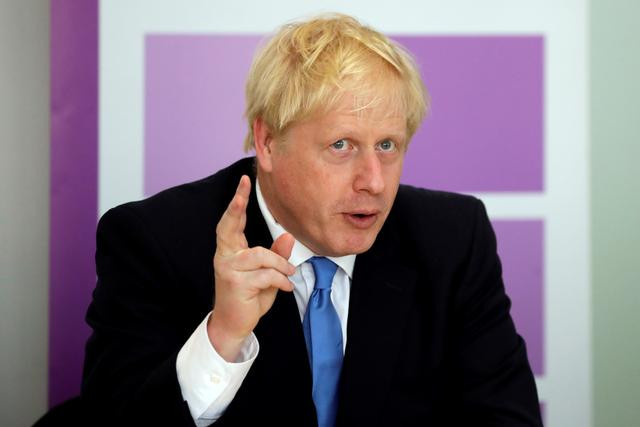 Ukraine reports 5,276 new COVID-19 cases
Ukraine reports 5,276 new COVID-19 cases
 Zelensky: Every third Ukrainian considers road construction one of greatest achievements of 2021
Zelensky: Every third Ukrainian considers road construction one of greatest achievements of 2021
 Ukraine ready to implement Minsk agreements, but Russia's desire needed - Yermak
Ukraine ready to implement Minsk agreements, but Russia's desire needed - Yermak
 Michel: EU unanimously agree to roll over economic sanctions against Russia
Michel: EU unanimously agree to roll over economic sanctions against Russia
 Actions by Ukraine's partners will help prevent worst-case scenario - Zelensky
Actions by Ukraine's partners will help prevent worst-case scenario - Zelensky
 COVID-19 in Ukraine: Health officials confirm 8,899 daily cases as of Dec 17
COVID-19 in Ukraine: Health officials confirm 8,899 daily cases as of Dec 17
 Macron tells Zelensky he declared support for Ukraine in call with Putin
Macron tells Zelensky he declared support for Ukraine in call with Putin
 Zelensky, Scholz discuss gas transit through Ukraine after 2024
Zelensky, Scholz discuss gas transit through Ukraine after 2024
 Ukraine ready for any format of talks with Russia - Zelensky
Ukraine ready for any format of talks with Russia - Zelensky
 Ukraine’s only journalist in Russia facing extremism charges - lawyer
Ukraine’s only journalist in Russia facing extremism charges - lawyer
 PM Shmyhal: First two applications for investment projects worth $96 million filed
PM Shmyhal: First two applications for investment projects worth $96 million filed
 Zelensky, PM of Italy discuss security situation around Ukraine
Zelensky, PM of Italy discuss security situation around Ukraine
 President signs off State Budget 2022
President signs off State Budget 2022
 London considering all options for responding to Russia's aggression against Ukraine
London considering all options for responding to Russia's aggression against Ukraine
 Putin, Biden to hold another round of talks
Putin, Biden to hold another round of talks
 Some 260,000 Ukrainians “victims of human trafficking” over 30 years - prosecutor general
Some 260,000 Ukrainians “victims of human trafficking” over 30 years - prosecutor general
 Ukraine plans to create center to protect energy infrastructure from cyber attacks
Ukraine plans to create center to protect energy infrastructure from cyber attacks
 No clear idea so far when Normandy Four top diplomats set to meet - German Ambassador
No clear idea so far when Normandy Four top diplomats set to meet - German Ambassador
 Ukraine receives EUR 600M in macro-financial assistance from EU
Ukraine receives EUR 600M in macro-financial assistance from EU
 Zelensky holds phone conversation with PM of Israel
Zelensky holds phone conversation with PM of Israel
 Ukraine sets new daily COVID vaccination record
Ukraine sets new daily COVID vaccination record
 MFA: European Union has not yet removed Ukraine from list of safe countries
MFA: European Union has not yet removed Ukraine from list of safe countries
 Kyiv records 1,023 new COVID-19 cases, 29 deaths
Kyiv records 1,023 new COVID-19 cases, 29 deaths
 G7 ambassadors welcome adoption of law on NABU status
G7 ambassadors welcome adoption of law on NABU status
 Ukraine can increase Covid vaccination rates to 1.5M a week – Liashko
Ukraine can increase Covid vaccination rates to 1.5M a week – Liashko
Prime Minister Boris Johnson will announce a 1.8 billion pound ($2.2 billion) cash injection for Britain’s public health system on Monday, seeking to honor his Brexit pledges as he pushes through the country’s departure from the European Union.
Johnson, a figurehead for the “Leave” campaign in the 2016 referendum, has long been associated with a pledge, emblazoned on a bus, that Britain could spend 350 million pounds a week on the National Health Service (NHS) if the country left the EU.
That has long been criticized as fanciful by critics, but his swift move to fund the upgrade of facilities and equipment, and to push on with infrastructure projects is aimed at offering people a taste of what he sees as the benefits of Brexit.
But by ushering in a spending spree on health, education and policing after years of economic austerity, Johnson has fueled expectations of an early election — something his team says will not happen before Britain leaves the EU on Oct. 31, with or without a deal.
Many lawmakers are deeply opposed to a no-deal departure, and have pledged to try to stop any such attempt by Johnson’s government, setting up a standoff when parliament returns to work next month that could deepen the Brexit crisis.
“Today I’m delivering on this promise with a 1.8 billion pounds cash injection — meaning more beds, new wards, and extra life-saving equipment to ensure patients continue to receive world-class care,” Johnson said in a statement.
“It’s time to face up to this challenge and make sure the NHS receives the funds it needs, to continue being the best healthcare service in the world,” he said before visiting a hospital in Lincolnshire, eastern England, on Monday.
On Sunday, James Cleverly, chairman of Johnson’s Conservative Party, said the funding would come from “economic growth” — something the Bank of England has said is under threat from Brexit uncertainty and a slowing global economy.
Johnson has said he is willing to funnel more money into public services, using the previous government’s so-called “fiscal headroom”, which had been earmarked to support the economy through a no-deal scenario.
The new prime minister has also committed to putting money into policing, education and regional infrastructure projects, a spending spree that opposition lawmakers describe as evidence the government is on an election footing for later this year.
It is expected that the Labour Party will bring a motion of no confidence in the government after parliament returns to work in September to try to stop a no-deal Brexit, but Johnson’s top aide was reported as saying such a move would not work.
Dominic Cummings, one of the architects of the Leave campaign, was reported by the Sunday Telegraph as saying that Johnson could schedule a national election after the Oct. 31 Brexit deadline if he lost a vote of no confidence.












































































































































